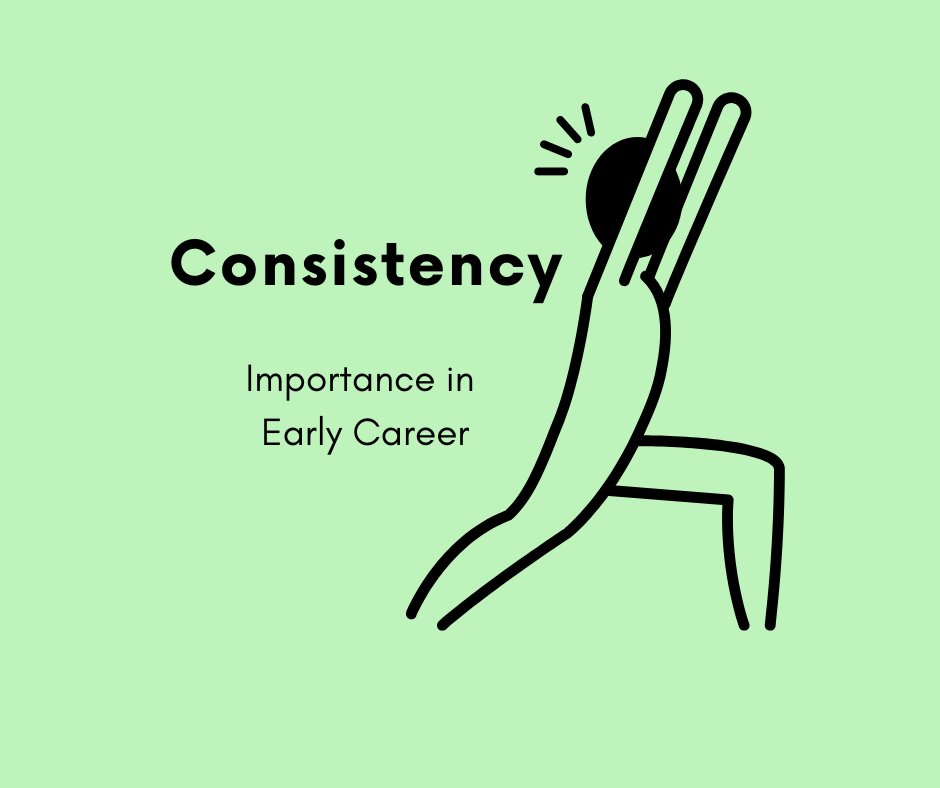Consistency in the context of an early career refers to maintaining certain habits, behaviors, and attitudes that contribute to professional development and success during this phase. It involves sustained effort and a long-term commitment to specific actions and goals. Consistency in these areas helps you build a strong foundation for future success, establish a positive professional reputation, and maximize your growth opportunities during the early stages of your career. Maintaining consistency, is important when starting a new career for several reasons
Learning and Skill Development
Consistently investing time and effort into learning and skill development is crucial in the early stages of your career. This could involve staying updated with industry trends, attending relevant workshops or training programs, seeking feedback from mentors, and actively seeking opportunities to expand your knowledge and expertise.
Professional Growth
Consistency in setting and working towards professional goals is essential. By setting clear objectives and consistently working towards them, you create a disciplined approach that propels you forward. This includes regularly assessing your progress, identifying areas for improvement, and taking consistent action to develop the skills and experiences necessary for advancement in your field. Consistent effort and progress compound over time, leading to significant accomplishments.
Work Ethic and Quality of Work
Developing a strong work ethic and consistently delivering high-quality work is important in building your professional reputation. Being reliable, punctual, and diligent in your work helps establish a positive perception of your capabilities and reliability, which can lead to increased opportunities and responsibilities.
Networking and Relationship Building
Building and maintaining professional relationships is crucial in the early stages of your career. Consistently attending industry events, engaging with colleagues, seeking mentorship, and nurturing connections can provide valuable insights, support, and potential career opportunities. Consistency in your interactions with colleagues and superiors helps foster positive professional relationships. When you consistently display respect, collaboration, and reliability, it enhances teamwork, networking opportunities, and the likelihood of receiving support and mentorship.
Professional Conduct
Consistency in displaying professionalism and ethical behavior is vital. This includes maintaining a positive attitude, demonstrating respect towards colleagues and superiors, communicating effectively, and adhering to professional standards and expectations. Consistency in your work ethic and performance contributes to shaping your professional reputation. If you consistently demonstrate dedication, reliability, and competence, it will enhance your standing within your industry or field.
Adaptability and Openness to Feedback
Consistency in being adaptable and open to feedback allows you to learn and grow rapidly in your early career. Embracing new challenges, seeking feedback, and demonstrating a willingness to learn from mistakes and make improvements contributes to your professional development. Consistency doesn’t imply stagnation; it means maintaining a core set of values and principles while adapting to changing circumstances. By consistently demonstrating adaptability and resilience, you show your ability to navigate challenges and seize new opportunities, which is essential in a dynamic career landscape.
Remember that maintaining consistency doesn’t mean being inflexible or resistant to change. It involves aligning your actions, values, and goals while adapting to new circumstances and evolving your skills. Consistency provides a strong foundation for professional growth, reputation, and success in your chosen career path.
Personal Branding
Establishing and maintaining a consistent personal brand is important early on. This includes defining your professional identity, consistently showcasing your skills and expertise, and aligning your online presence (such as social media profiles and personal websites) with your career aspirations. Consistency in your actions, communication, and work allows you to develop a strong personal brand. By consistently showcasing your skills, values, and expertise, you can establish yourself as an authority or go-to person in your area of specialization.
Building Trust
Consistency helps you build trust and credibility with colleagues, clients, and superiors. When you consistently deliver high-quality work, meet deadlines, and display professionalism, people develop confidence in your abilities and are more likely to rely on you.
Long-Term Growth
Consistency enables you to sustain long-term growth and progress in your career. By consistently improving your skills, seeking new opportunities, and staying updated with industry trends, you can maintain momentum and increase your chances of success.
Consistency in the early stages of a career involves maintaining habits, behaviors, and attitudes that foster learning, professional growth, networking, adaptability, and personal branding. By consistently investing in these areas, individuals can establish a solid foundation for future success and increase their chances of achieving their career goals.
References and Further Reading
- https://www.morningcoach.com/blog/how-to-be-consistent-and-why-it-s-important-to-your-success
- https://www.tes.com/magazine/archived/early-career-framework-everything-you-need-know
- https://www.indeed.com/career-advice/career-development/consistency-at-work
- https://www.linkedin.com/pulse/how-being-consistent-help-you-achieve-your-career-goals-wainaina
- https://bigthink.com/neuropsych/traits-of-a-successful-person/
- http://esginc.com/consistency-and-resilience-key-factors-for-career-success/
- https://www.actioncoach.com/blog/what-does-consistency-mean-in-the-workplace/
